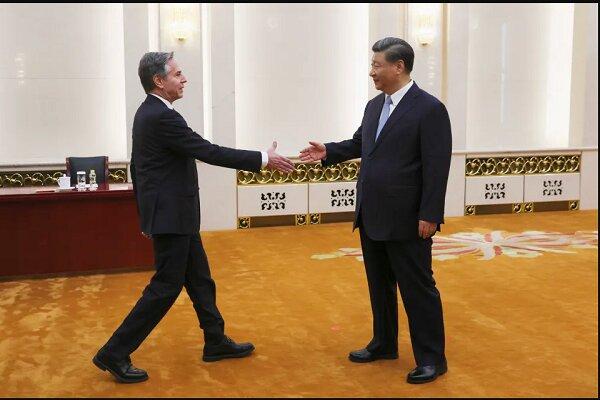Seyyed Reza Mirtaher told the Strategic Council on Foreign Relations that Anthony Blinken’s visit to Beijing as the first US Secretary of State to China visit in the past five years was an attempt to reduce tensions between the two countries.
He added that considering the hostile positions of the US and the intensification of covert and overt support for Taiwan’s independence, as well as Washington’s other measures regarding sanctions against Chinese companies and enterprises, and even high-ranking Chinese politicians and officials, along with other US commercial, military and security pressures against China, especially in the Asia-Pacific region, we are witness to China’s tough stance towards Washington to the extent that on the sidelines of the annual security summit known as “Shangri-La” talks in Singapore, the Chinese Defense Minister refused to shake hands and meet with the US Defense Minister.
He added that this action, as a symbolic matter, mostly shows the tension and deterioration of the situation between the two countries. In this situation, the visit of US foreign minister was done to help reduce the tension, and the US insisted on preventing any military tension between the US and China by establishing a particular communication line between the two countries.
This expert on international issues stated that Blinken did not find much success in this field during his trip to Beijing and stated that the Chinese officials in meeting with him warned Washington not to step on China’s interests, drop its hostile dealings with this country and try to move in a peaceful environment based on mutual interests.
Mir Taher added that although Blinken announced that the US policy is not to support Taiwan’s independence, the reality is different. Washington plays a very decisive role in encouraging Taiwan to seek independence and adopt hostile positions towards China.
He reminded that after announcing these positions of the US towards Taiwan, during a speech, the President of the United States openly called Xi Jinping a “dictator,” and this issue ignited the fire of tensions between China and the United States. While China thought that according to Blinken’s trip after five years, the US would seek a more peaceful approach, Biden’s statements provoked strong protests from the Chinese. They showed that Washington seriously assesses that China can become a major challenge in the near future regarding security.
According to Mirtaher, implementing the agreement between China and the United States during Blinken’s trip to China to “continue diplomatic interaction through more meetings with American officials in the coming weeks and months” seems far from reach with these statements by Biden.
This analyst of international issues, stating that in any case, the US has identified China as the most important geostrategic challenge in the 21st century and continues to try to contain China in various fields, referred to Blinken’s assessment that China and the US have deep differences with each other and reminded that despite US claim about trying to improve relations and de-escalate with Beijing, which was crystallized by Blinken’s recent trip to Beijing and meeting with senior Chinese officials, Biden’s new words show that Washington has not only not changed its hostile stance towards Beijing, but the US President insults the Chinese counterparts in words that conflict with political and diplomatic etiquette.
Mirtaher did not consider Blinken’s trip to China to reduce tensions between Beijing and Washington to be successful and continued that Xi Jinping, in his meeting with Blinken, emphasized that Washington should respect China and its legal rights and interests. After two days of meetings in Beijing with Chinese officials, Blinken said that no progress had been made in resuming direct military contact with China. Of course, the level of tensions between the two countries is so high that American officials and analysts had predicted before the trip that it would not achieve much in solving the differences between them and would not positively affect their tense relations.
This analyst of international issues pointed to the frank, demanding. The critical tone of the Chinese officials in the meetings with the American Foreign Minister stated that the Chinese Foreign Minister also emphasized in the meeting with Blinken that the relations between China and the United States are at their lowest level and that Taiwan is the most significant danger in this connection.
He added that the party that insisted on making this trip was the US, and the Chinese basically did not want to do it. Before that, even in terms of symbolic diplomatic actions, they displayed the coldness of relations and unwillingness to establish relations with American officials.
The Chinese used Blinken’s trip to Beijing more as an opportunity to announce their positions and warn the US, and in general, the US had a passive position in this regard.
Mirtaher emphasized that the Biden administration has clearly adopted a more aggressive approach to its rival powers, especially China and Russia, than the Trump administration in its foreign policy. Although the Trump administration had also created a trade war, the confrontation of the Biden administration with China is in different fields, and it has an entirely hostile approach to Russia. This shows that the US is very afraid of the joint effort of China and Russia to redefine the world order and create a multipolar order. At the same time, they know that with the current trend, they will lose their superior economic position in the world, and in the next few years, China will emerge as the first economic power along with it in other fields. This is not a scenario that is desirable for the US.










0 Comments